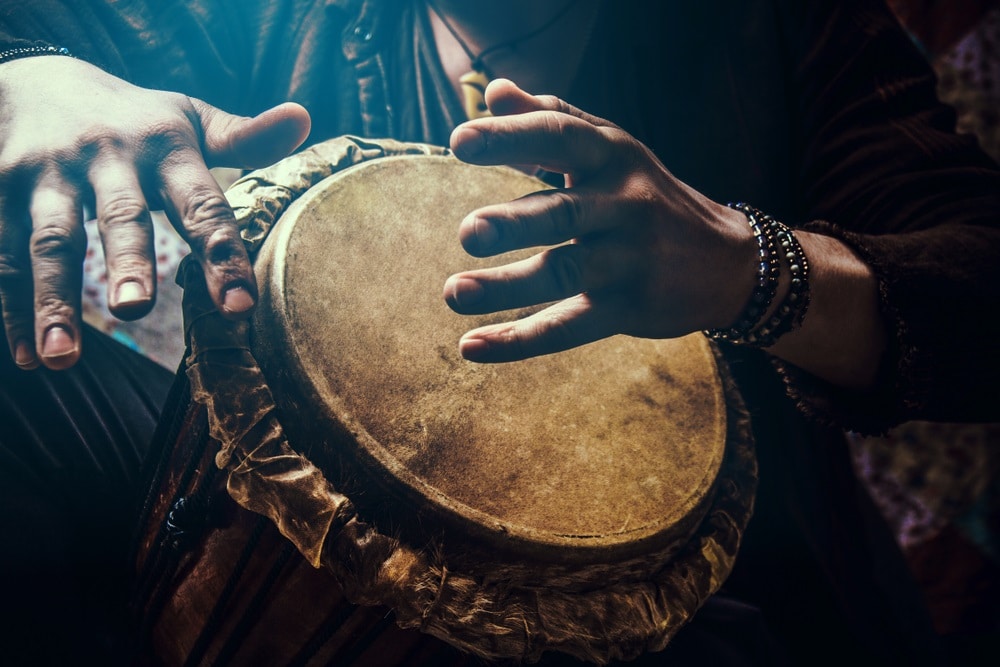
Reggae music has had a profound influence on many aspects of Western culture from fashion to popular music. Across the United Kingdom, the USA and Africa, Reggae secured a strong foothold in the fabric of the people.
Often Reggae music became the outlet for an oppressed people whose message found its way to the hearts of thousands. Its origins date approximately back to Jamaica in the 1960s.
Reggae Music’s History and Influence
The Origins of Ska and Its Influence on Reggae
Ska was the predecessor to Reggae. It evolved as a new music genre from the ever-popular rhythm and blues of the late 1940s in the US. Where Ska diverged from R&B is in its skillful fusion of Caribbean and Cuban music with rhythm and blues.
In particular, you can hear the mambo and the mento (from Jamaica), which brings a unique rhythmic feel to Ska. If you listen to this early music you’ll hear some of the characteristics of Reggae such as the off-beat guitar chords, and steady four-beat drum patterns with kick drum accents on second and fourth beats.
Ska was largely an instrumental kind of music with some major stars emerging in the late 1950s. Artists such as Justin Hinds and Toots and the Maytals offer a clear window into Ska and the origins of Reggae.
Don Drummond was a key figure in the movement. Drummond was an arranger, composer and trombonist who became the dominant force in the hugely successful Ska group formed by Tommy McCook called The Skatalites.
The Evolution of Reggae
Reggae takes quite a different pathway to Ska and Rocksteady music. One obvious difference is that Reggae uses vocals. The sung element of Reggae is of vital importance as it is through the lyrics that the highly charged political messages are delivered.
It’s important to remember Reggae’s strong ties to the Rastafari movement. Not only does the philosophy of Rastafarianism thread through Reggae but also musical elements too. The Nyabinghi rhythm that is used in Rastafari celebrations calling the people together can be heard in some songs.
From the early Reggae artists like Lee ‘Scratch’ Perry and Eric ‘Monty’ Morris came the style of Reggae music we easily recognize today.
Of all the artists associated with Reggae, Bob Marley and The Wailers are probably the ones that trip off the tongue if you ask someone to name a Reggae artist or band. (Keep in mind The Wailers included Pete Tosh and Bunny Wailer).
Bob Marley and His Lasting Impact on Reggae Music
Bob Marley was such an important and influential musician that he deserves far more than mere mention. His place of birth was St. Ann in Jamaica on February 6th, 1945.
What Marley achieved was the perfect amalgam of rocksteady and ska into a new style of Reggae music that travelled through the 1970s, propelling Marley to international stardom.
His pathway to the halls of fame started when he, fortunately, recorded with producer Leslie Kong. The song Marley recorded was Judge Not, which drew inspiration from his grandfather. This was in 1961.
By 1963, Marley in his band called the Wailers, embarked on a recording at Coxsone Dodd’s Studio of Marley’s song Simmer Down. This track marked a departure from the ballad feel of Judge Not, taking as its subject material life in Kingston Town, Jamaica and the struggles of the working people.
The song gained considerable attention, becoming an almost overnight success. What Simmer Down achieved was more than just a fine reception. For the first time a reggae record did not mimic or pay homage to other popular styles, it told a hard truth in the way Marley would go forward.
Marley became the voice for the underclass people of the Caribbean. He carved out a new and proud identity for these unheard, forgotten voices.
With the release of the album Catch A Fire (1972) on Island Records, Bob Marley and the Wailers had become superstars and produced the first reggae album designed as such.
From here Bob Marley continued for the rest of his short life to be the voice of the oppressed. Songs such as Exodus, No Woman, No Cry, I Shot The Sherriff, and Could You Be Loved, became iconic songs that have spread Marley’s truths and messages to millions across the world.
In Bob Marley’s passionate and erudite songs, he and the Wailers developed a type of reggae that not only assimilated earlier styles but added a bhat created considerable appeal.
It was a style that many future bands took on board and developed into their style. The social struggles, the political emphasis and the persistent discrimination did not always carry through to other band’s work but the style and feel of Marley’s music frequently did.
The Influence of Reggae on UK Bands
In the late 1970s, a UK band called The Police formed in London, England. In 1978, their album Outlandos d’Amour, which included huge hits like Roxanne and Can’t Stand Losing You, reached sixth place in the UK album charts.
Their success continued at lightning speed with their next albums enjoying higher chart places. The Police’s musical style took much from reggae music but perhaps in a similar way to Marley, blended it ingeniously with other genres of music that interested them.
Other reggae-influenced bands, notably in the UK included UB40 who made a massive contribution to the reggae scene throughout the 1980s and 90s. Hits such as Red, Red Wine, and Kingston Town were mammoth hits for the band.
Equally, the 1970s saw a Ska revival in the UK headed up by brilliant bands like Madness, Specials, and Selecter. These bands were consciously multiracial, helping to bring about new cultural awareness that sought to challenge discrimination.
Contemporary Artists Keeping the Spirit Alive
Reggae music is very much alive and skanking today with the spirit of artists like Bob Marley and Pete Tosh never far away. As a testament to the enduring popularity of reggae, numerous festivals across the world celebrate old and new artists and bands.
The style may vary but the essence of reggae is at the heart of many contemporary artists. There are too many to name here, but Naomi Cowan, Lila Ike, T’jean, and Royal Blu are a fine place to start listening to today’s reggae music./div>


